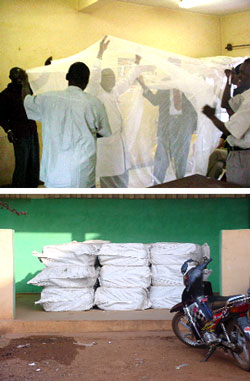
(FinalCall.com) – For the mere cost of only $10 a child’s life can be spared from malaria and certain death with an insecticide treated bed net. Seems simple and easy but malaria is the number one killer of children under five in Sub Saharan Africa. For only $2 medicine can be bought and given to those infected.
Malaria No More is an international organization dedicated to eradicating malaria. It engages individuals, organizations and corporations in the private sector to provide life saving bed nets and other critical interventions to families in need.
From December 9-14, they took a Muslim delegation, Saafir Rabb, Randa Kuziez, Ilyasah Shabazz, Aisha al-Adawiya and Dr. Sulayman Nyang to Mali, which is 90 percent Muslim, for a bed net distribution.
“Forty percent of the people who die from malaria are Muslims,” said Saleemah Abdul-Ghafur, Consultant to Malaria No More. “This delegation represented America’s Muslim community and we distributed 2.2 million bed nets. The most at risk children are now covered.”
“We know what will save children from malaria but every 30 seconds a child dies from malaria. We want to eliminate malaria by the year 2012. This is a disease of the developing world and we have an opportunity for a win on the continent so plagued with disease,” she told The Final Call.
According to Malaria No More, the blood disease is caused by a parasite transmitted from person to person by certain types of mosquitoes.
Its symptoms, which appear about 9 to 14 days after the infectious mosquito bite, include fever, headache, vomiting and other flu-like symptoms. If drugs are not available for treatment or if the parasites are resistant to them, the infection can lead to coma, severe life-threatening anemia, and death by infecting and destroying red blood cells and by clogging the capillaries that carry blood to the brain (cerebral malaria) or other vital organs.
Worldwide, malaria causes around 350 to 500 million illnesses and more than one million deaths annually.
“My question is why don’t we know in America that malaria is the number one killer of children in Africa and not HIV? It’s a really preventable disease,” said Ms. Al-Adawiya, the Founder and Executive Director of Women In Islam Inc., an organization of Muslim women, which focuses on human rights and social justice.
“I was impressed with the incredible dignity of the people of Mali. You realize people are suffering with poverty but the way they carry themselves you have to remind yourself that they are poor. They are not beggars. That really stuck out for me.”
Saving more and more lives from infected mosquitoes has become a national effort.
Senegalese President Abdoulaye Wade expressed recently, in order to be successful, the fight against malaria must be a comprehensive one which includes giving families and individuals insecticide-treated bed nets to sleep under, taking steps to kill mosquitoes where they breed, and when they enter houses to feed at night, and making anti-malarial drugs such as artemisinin-based combination therapies more widely available.
For Saafir Rabb, a representative of Imam Warith Deen Muhammad’s community, the trip was amazing.
“It was an incredible experience. One thing that was significant was that it allowed human beings from different walks of life and different ideologies to come together for the same cause and to meet the needs of people suffering,” he told The Final Call.
“It’s clear that this (Africa) is our country, our beginning. There was a clear spiritual connection with the people. We were speaking to our elders, our parents, our brothers and sisters. We used our connections here to advance the people there where someone dies every 30 seconds from malaria.”
The delegation toured health centers and villages and had a ceremonial bed net distribution ceremony. They met with government officials and high-level country leadership
“It was overwhelming to see the poverty and the children,” said Randa Kuziez of the Muslim Student Association. “The fact that we were an all Muslim delegation added a unique perspective to the campaign. They arranged a meeting for us with their Muslim leaders.
“We visited clinics and met with children. We also visited a mosque that was filled with about 60 women who immediately came to greet us when we went in. We had a group prayer and their hospitality was fabulous. We don’t speak the same language but we communicated with prayers.”












